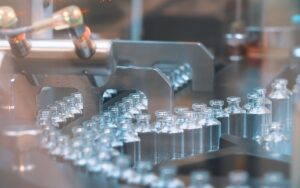
The rapid growth of Massachusetts’ biotech industry has added drugmakers to the list of sectors competing for a slice of the state’s limited industrial real estate development pipeline.
President Joe Biden is launching a new initiative to encourage biotech production and research in the U.S., the latest move by the White House to boost domestic industry. And it could generate more demand in a growing subsector of Boston’s life science real estate industry.
Biden on Monday signed an executive order implementing the initiative and later, in remarks at the John F. Kennedy Presidential Library in Boston, will address how biotech can help fight cancer. On Wednesday, the Democratic president’s administration will host a summit and announce new investments from several federal agencies, according to a White House fact sheet.
As of publication time, the executive order had not yet been published in the Federal Register, so details were still unclear, but the administration indicated the initiative will seek to boost biomanufacturing in pharmaceuticals but also in other industries such as agriculture, plastics and energy. A senior administration official wouldn’t say how much funding will be announced Wednesday.
While much of the publicity around Greater Boston’s life science real estate boom over the last two years has gone to lab real estate, developers like King Street Properties and Nordblom Co. and government entities like the Worcester Business Development Corp. have bet on a growing need to make the drugs discovered in those labs. Industry observers say that as new drugs go into clinical trials, researchers will need to be able to visit frequently to iron out production problems and other tasks. Until now, most of this biomanufacturing work has been done in contract facilities scattered across the country and, in some cases, the globe.
Biomanufacturing projects are proposed or underway in Andover, Billerica, Burlington, Revere, Worcester and the state-run Devens business park, among others.
The executive order follows bipartisan legislation Biden signed last month that provided $52 billion to subsidize the production of semiconductors, construction of new chip plants and research and development in the United States.
That legislation was intended to reduce the U.S. economy’s reliance on semiconductors made overseas, particularly in Taiwan, and to respond to greater efforts by China to develop its own chip industry.
Biden touted the benefits of the semiconductor law on Friday, in a stop in Columbus, Ohio, where chip giant Intel has broken ground on a new $20 billion factory.
The administration official, who wasn’t authorized to speak publicly and insisted on anonymity, said the White House wants to support manufacturing biotech products that are developed in the U.S., rather than seeing American innovations produced abroad.
The official said that the administration was aiming to expand domestic biomanufacturing capacity and that other countries, especially China, have been aggressively investing in the sector, posing risks to U.S. leadership and competitiveness.






